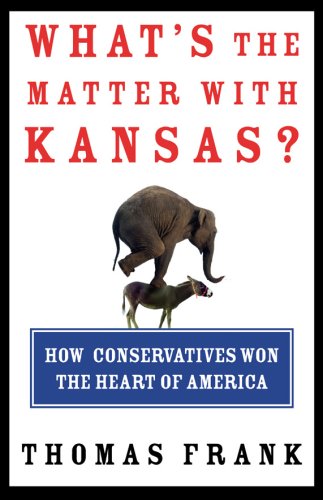What do you think?
Rate this book


Audiobook
First published January 1, 2004
"Ask a liberal pundit what ails the red states, what has induced them to work so strenuously against their own economic interests, to vote Republican...and he will probably tell you it's all because of racism.Interesting. Where did that come from, more than halfway through his book-length argument, the first mention of race. Why raise it at all? I wonder what he would say now, knowing what we all do about Kansas and their not-race problem.
There are undeniably a great number of places where this...[is] true, but Kansas is not one of them."
Strip them of their job security, and they head out to become registered Republicans. Push them off their land, and the next thing you know they’re protesting in front of abortion clinics. Squander their life savings on manicures for the CEOs, and there’s a good chance they’ll join the John Birch Society. (68)One good example is a particular county that has 29% of its income coming from government benefits, but the residents therein want the gubmint to leave them alone (they voted to secede from Kansas in 1992, apparently, emblematic of right-populist myopia) (84-85). Ostensibly much of the Backlash movement calls for a certain sense of “authenticity” (28)—for which we must of course consult Herf’s Reactionary Modernism.
Survivalist supply shops sprout in neighborhood strip malls. People send Christmas cards urging friends to look on the bright side of Islamic terrorism, since the Rapture is now clearly at hand. […] The Kansas school board draws the guffaws of the world for purging state science standards of references to evolution. Cities large and small still hold out against water fluoridation, while one tiny hamlet takes the additional step of requiring firearms in every home. A prominent female politician expresses public doubts about the wisdom of women’s suffrage, while another pol proposes that the state sell off the Kansas Turnpike in order to solve its budget crisis. (35)So, yeah, what appears now as teabagger bullshit, but already in 2005. There is a definite economic base here that produces the deranged superstructures: “farmers struggle to make a living on the most fertile and productive land in the world” (36).
The pro-life origins of the Kansas conservative movement present us with a striking historical irony. Historians often attribute the withering and disappearance of the nineteenth-century Populist movement to its failure to achieve material, real-world goals. It never managed to nationalize the railroads, or set up an agricultural price-support system, or remonetize silver, the argument does, and eventually voters got sick of its endless calls to take a stand against the ‘money power.’ Yet with the pro-life movement, the material goal of stopping abortion is, almost by definition, beyond achieving. (96)The point here is that the culture war is unwinnable by calculated intention. Both state and national Backlashers “have made virtually no headway in the culture wars” (101). They have failed to stop abortion or abolish public schools or refute evolutionary theory. Indeed, “the issues the Cons emphasize seem all to have been chosen precisely because they are not capable of being resolved by the judicious application of state power” (id.). By contrast, however, “in only one area have the Cons achieved a tangible, real-world victory. Their intractable hostility to taxes of all kinds has successfully brought disaster on the state government” (id.). Agitation in favor of “one’s material interests are suspended in favor of vague cultural grievances that are all-important and yet incapable of ever being assuaged”; in fact, as a movement, “the backlash has pretty much been a complete bust” (121). The culture war however was “born to lose,” and “its goal is not to win cultural battles but to take offense, conspicuously, vocally, even flamboyantly” (121-22). Anti-intellectualism “is one of the grand unifying themes” (191), which ties into a more sinister anti-judaism.
Conservative listservs abound with bizarre speculation about what atrocity the liberals will inflict on us tomorrow, each wild suggestion made and received with complete seriousness. The liberal elite is going to outlaw major league sports. Forbid red meat. Mandate special holidays for transgendered war veterans. Hand our neighborhood over to an Indian tribe. Decree that only gay couples can adopt children. Ban the Bible. (125)The next step in the process is to explain the failure of the culture war: “blame liberalism” (131). Texts from the backlash “abound with inventive ways of presenting this essentially conspiratorial understanding of culture” (id.), wherein the liberal elite always swindles and sabotages the virtuous acts of the culture warriors.